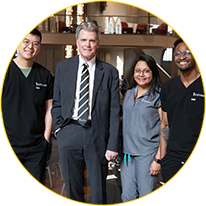On Nov. 29, Rear Adm. Timothy L. Ricks, DMD, MPH, chief dental officer and assistant surgeon general of the U.S. Public Health Service, visited the University of Maryland School of Dentistry (UMSOD). Ricks guest-lectured the D1 and senior dental hygiene students in Professor Mark Macek's EBDM 511/DHYG 416: Principles of Scientific Evidence class, discussing important issues such as the opioid crisis, tobacco use, and oral health disparities.
"Future dentists and dental hygienists need to be aware of the oral health challenges that Americans face so that they are ready to meet them, head-on," Macek, DDS, DrPH, says. "The students in my course were given a valuable opportunity to hear about these challenges directly from Rear Adm. Ricks."
In his presentation, Ricks noted that almost a third of the pharmaceuticals prescribed by dentists are opioids — and that for children and young adults, dentists are the primary subscribers of opioids. In response to this, Ricks pointed to the American Dental Association's 2016 recommendations for dentists prescribing opioids, which include such actions as better educating patients and taking part in prescription drug monitoring programs.
Another key statistic Ricks provided the class was that, startlingly, more than 10 times as many Americans have died due to smoking as in all our nation's wars. He provided options for dental students and dentists treating patients who wish to quit — as well as those who do not — emphasizing the role oral health practitioners can have in tobacco cessation.
Ricks' presentation also showed how poor oral health has real and serious economic consequences. For instance, employees miss 164 million hours of work annually in the United States due to dental emergencies. In what is a vicious cycle, Ricks noted that lower-income adults are less likely to go to the dentist — not just because they're worried about cost, but their job security if they do take leave.
"I support the U.S. surgeon general in his effort to tie oral health, and all health, to the economy," Ricks says. "Our country needs a healthy workforce."
Ricks noted that Vice Adm. Jerome M. Adams, MD, MPH, the current surgeon general, has prioritized oral health. Adams' emphasis on the importance of oral health in public health is part of a broader shift in attitude toward the discipline.
Referring to his generation, Ricks told students that "we grew up in a world where oral health was in its own little silo, not attached to the rest of the body." Now, fortunately, "oral health is seen as critical to overall health, not just related [to it]."
But disparities in oral health remain a stubborn problem. Ricks characterized the lack of access to dental care in rural and majority-minority areas as a "significant crisis," advising students to "keep an open mind to all possibilities and consider working in underserved areas."
After all, "if you get into dentistry for the right reason — to serve people," Ricks noted, "it is an awesome experience and very rewarding."

Rear Adm. Timothy L. Ricks, DMD, MPH, chief dental officer and assistant surgeon general of the U.S. Public Health Service
"I support the U.S. surgeon general in his effort to tie oral health, and all health, to the economy," Ricks says. "Our country needs a healthy workforce."
Ricks noted that Vice Adm. Jerome M. Adams, MD, MPH, the current surgeon general, has prioritized oral health. Adams' emphasis on the importance of oral health in public health is part of a broader shift in attitude toward the discipline.
Referring to his generation, Ricks told students that "we grew up in a world where oral health was in its own little silo, not attached to the rest of the body." Now, fortunately, "oral health is seen as critical to overall health, not just related [to it]."
But disparities in oral health remain a stubborn problem. Ricks characterized the lack of access to dental care in rural and majority-minority areas as a "significant crisis," advising students to "keep an open mind to all possibilities and consider working in underserved areas."
After all, "if you get into dentistry for the right reason — to serve people," Ricks noted, "it is an awesome experience and very rewarding.



